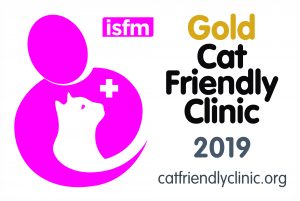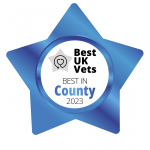Our team of compassionate and highly skilled veterinary surgeons have the medical and surgical experience to perform all routine surgeries and many non-routine procedures, such as orthopaedic surgery, on site. We believe in investing in our vets and equipment and keeping up to date with advancements in medicine. Our surgeries’ equipment is of the highest quality with ultrasound, digital radiography, laser therapy, full orthopaedic kits and high quality Doppler ultrasound. If your pet requires surgery, or has a complicated health problem you know that our team will have the skills to treat them safely. Just like NHS doctors they undertake regular CPD training, ensuring that your pet receives the very best veterinary treatments available.
Keyhole Surgery
What is it?
Laparoscopy is more commonly known as ‘keyhole surgery’. This procedure is carried out at our hospital site, Streatham Hill Vets and Blackheath Vets. It has been used in human surgery for years and more recently has been developed for use in veterinary surgery. Just like in human surgery the incisions are small and using a camera along with small instruments we are able to perform some routine surgeries.
Our group was one of the first in South London to introduce keyhole surgery and we have now carried out hundreds!
When do we use Keyhole?
We are using it for abdominal surgeries such as ovariectomies (spay), cryptorchid surgery (undescended testicles) and organ biopsies.
What are the benefits?
Keyhole surgery is a highly skilled procedure and has tremendous advantages over traditional open surgery including:
- Smaller incisions, so there is less trauma to the muscles and other tissue
- recovery time is much reduced
- there is less pain associated with the surgeries
- a lower risk of infections
- reduced surgery time and therefore time spent under anaesthesia and a happier pet!
If you would like to know a bit more or to book in, please contact Streatham Hill or Blackheath Vets.
Orthopaedic & Soft Tissue Surgery
Our surgeries Blackheath, Mayow and Streatham Hill Vets can perform more extensive surgeries including orthopaedic. Our certificate holding surgeons have the skills and equipment required to perform more intricate procedures, from delicate eye surgery to fracture repairs, reducing the need to refer your pet to more expensive specialist centres.
Safety and quality of care for all pets requiring surgery is paramount to us. Our surgical teams use a range of modern surgical equipment and x-ray facilities, and the highest quality orthopaedic implants.
Our lead surgeon, Gabriella has extensive experience fixing broken bones and soft tissue surgical procedures. Gabriella holds a Royal College of Veterinary Surgeons (RCVS) Certificate in Small Animal Surgery and is a RCVS recognised Advanced Practitioner in Small Animal Surgery.
Finance plan
If you would like to spread the cost of surgery, please talk to one of our team about our Finance Plan. We offer low cost finance options to help you spread the cost of paying for treatments.
In-house Laboratory
We use only cutting-edge technologies to give us unprecedented accuracy, speed and precision of laboratory tests. Occasionally, we need to use an external laboratory for more complex tests. These tests are couriered overnight ensuring we can report your pet’s test results as quickly as possible.
Blood samples, urine tests and microscopic examination of blood, skin and urine are checked using our in-house laboratory service providing results in a matter of minutes even on weekends.
Radiology
Most of our surgeries have the finest possible imaging equipment. We have access to a high resolution digital X-ray machine that enables us to take high quality x-rays quickly, which means less stress for the patient and faster diagnosis.
Ultrasound
What is an ultrasound?
An ultrasound exam is a non-invasive imaging technique that allows us to see what’s going on inside your pet using ultrasonic waves. We use ultrasound imaging at our Mayow Veterinary Surgery for diagnosing and staging of many diseases. The process is not painful and our team works hard to ensure it is as stress free as possible for your pet.
We have invested in the latest imaging technology to provide accurate and rapid diagnosis of a wide range of conditions. Our sonographers can map detailed information about your pet’s abdominal organs and allow non-invasive measurement of heart blood flow to help shape bespoke treatment plans.
Will my pet need an anaesthetic?
Anesthesia is not usually needed for most ultrasound examinations, unless biopsies are to be taken. The technique is totally painless and most pets will lie comfortably while the scan is being performed. Occasionally, if the pet is very frightened a sedative may be necessary.
Cardiology
Heart disease is one of the most commonly diagnosed conditions in dogs and cats. Early detection of a potential heart problem is so important and will not only improve the quality of life but often considerably lengthen the life span of affected animals. At an early stage your pet may not show any symptoms, we often pick up a potential problem during a routine visit.
We use several instruments to monitor the health of our patients hearts. We have the equipment to perform electrocardiographs (ECG), ultrasound scanning, radiographs (X-ray) and blood pressure monitoring. These diagnostic tools form an important part of the investigation and monitoring of heart disease and certain other conditions such as:
- Mitral valve disease
- Dilated cardiomyopathy
- Hypertrophic cardiomyopathy
Tonometry (eye pressure)
It is crucial for your pet’s vision that glaucoma and other problems with intraocular pressure (pressure within the eye) are detected and treated as quickly as possible. We can test your dog or cat’s eyes for excess pressure easily and safely. The test, performed with a device called a tonometer, is not painful and does not require sedation.
Call us immediately if you notice any of the following symptoms:
- dilated (enlarged) pupils
- clouding of the cornea
- red or bloodshot eyes
- one eye protruding
- squinting
- weeping from the eye
Microscopy & Cytology
Microscopes have many uses in a veterinary surgery. We use them to look for the eggs of intestinal parasites. They are helpful for diagnosing ear problems such as mites, bacterial infections, and yeast infections. Using a microscope can be quite useful for diagnosing skin infections and different forms of mites such as scabies and demodex.
When your pet has a lump, we may perform a fine needle aspiration. We will use a needle to pull cells out of the lump to identify them. We can diagnose fatty lumps just by looking at the cells under the microscope, though we may send more complicated samples to the laboratory.




